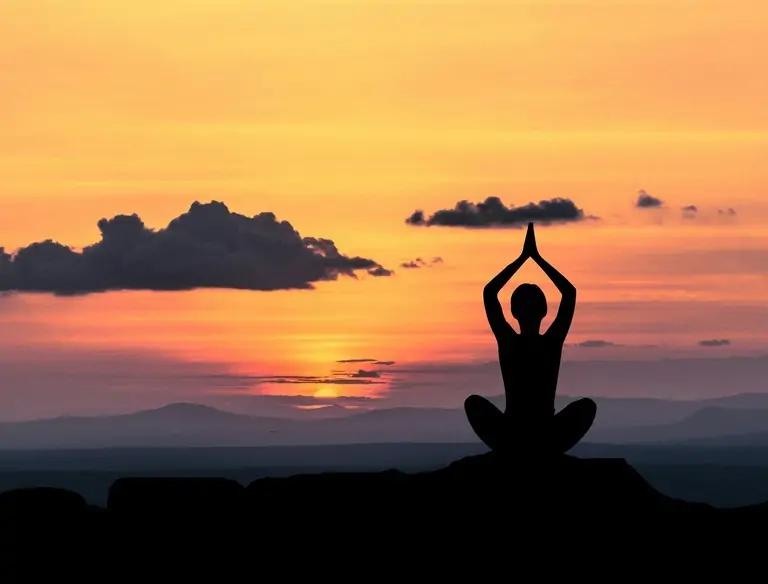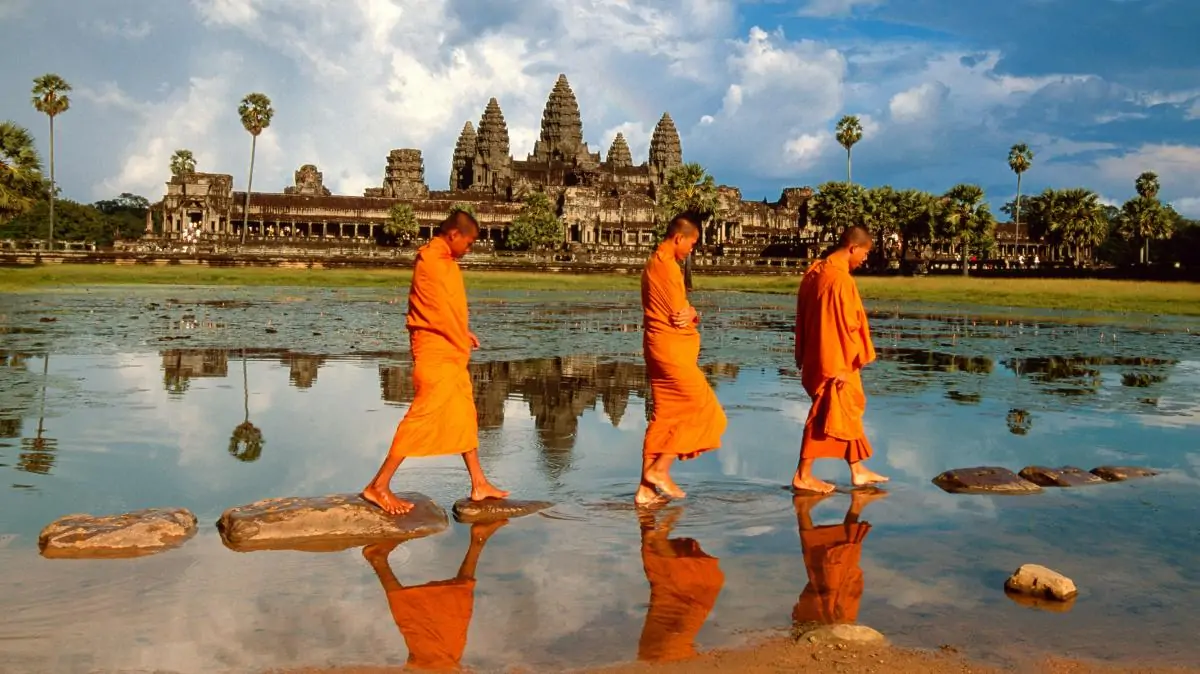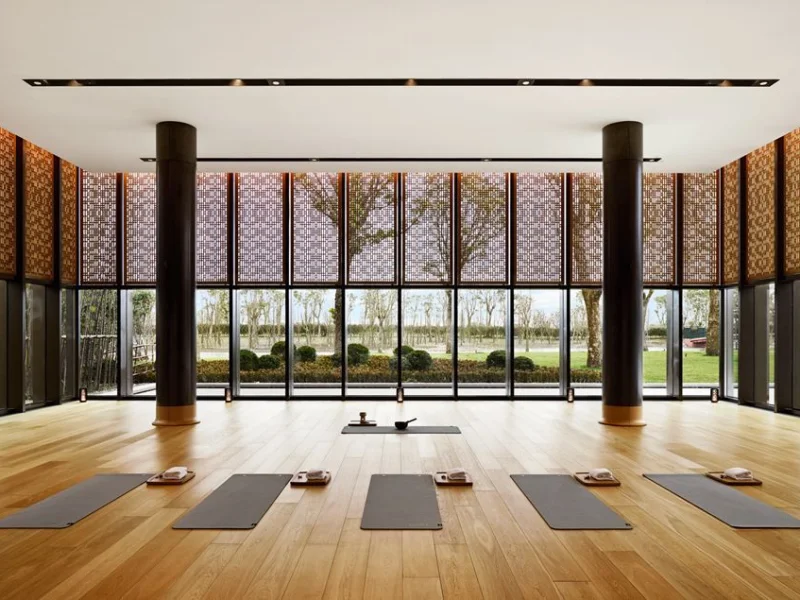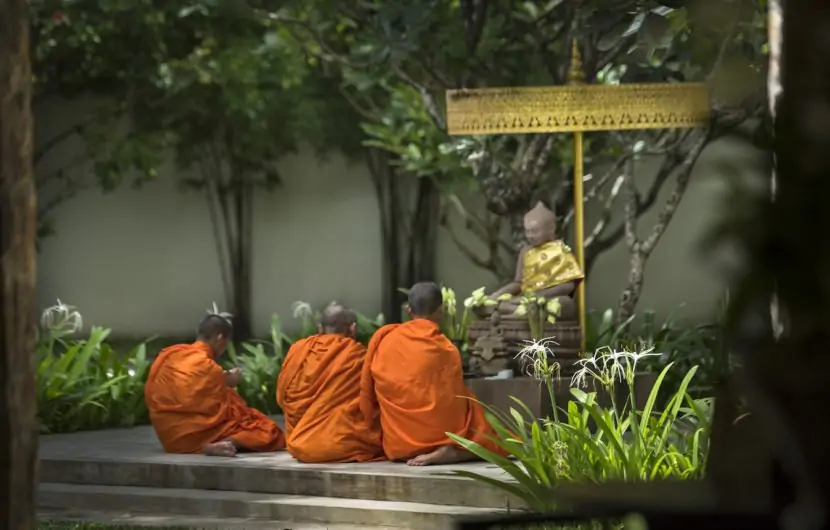Happiness is one thing that all of us want to be in our life. How can we reach this? How do we go in the right way in life? Well, some people believe that meditation is the first step towards happiness.
Let’s get a Buddhist retreat Cambodia to get your journey started. So, reward yourself with a Buddhist retreat Cambodia and hit refresh on your life.

1. Exploring Buddhist in Cambodia
The motto of Cambodia is “Nation, Religion, King”. That shows how much Buddhism–the national religion–matters for Cambodia’s cultural and social life.
In Cambodia, Buddhism is a religion of the nation. 95% of the Cambodian population believe in Theravada Buddhism and monks are an essential part of society. As known to Cambodians, Buddhism is more than just a religion. The pagoda, the heart of Cambodian life, was customary as a place of education. Many young Cambodian men, those from poor backgrounds, still enter the pagoda as a monk for anything between one and ten years to benefit from the Buddhist retreat in Cambodia provided.
Most of the monks were killed, and almost all temples were destroyed during the Khmer Rouge time. But afterward, Buddhism once again became the state religion.
Almost every part of life permeates Buddhist philosophy. It is hard to say where religious traditions stop and cultural niceties start. Adherence to the rituals of Buddhism is more common in the older generation.
Buddhism teaches rebirth and karma. Good actions are rewarded with good consequences and improved standing in the ensuing life cycle. Likewise, wicked deeds can cause terrible consequences and lower status in the subsequent life cycle. This can explain the seemingly insensitive treatment of poor or disabled people in Cambodian society, as many people consider their suffering to be the consequence of their past lives.
2. Why choose a Buddhist retreat Cambodia?
2.1. Cambodia is rich in history and tradition country
Cambodia is known as a country rich in history, tradition, and culture. And this country still catches the heart of the tourist because of its rich culture and customs. Take a Buddhist retreat Cambodia, you will get more knowledge about the special culture that only Cambodia has.

Cambodians are proud of their nation, history, and culture. As Rich in ancient ruins, Cambodia is home to Angkor Wat and the birthplace of the great Angkor Empire, which ruled over many parts of Southeast Asia during its peak from the 11th- to 13th-centuries.
This unique heritage is an enormous temple complex that is recognized as the largest religious monument in the world. It also is an area with beautiful, intricate stone buildings, including the famed Angkor Wat temple that is the symbol seen on Cambodia’s country flag. Cambodia is an exemplary spiritual destination.
2.2. The best spot for a traditional Buddhist retreat Cambodia
As a Buddhist country, Cambodia is not only a destination brimming with wonders but also an ideal destination for self-discovery, healing, and change.
In recent years, the kingdom has emerged as one of the premier wellness destinations in Asia. It is an ideal place for a traditional Buddhist retreat Cambodia as well.
With all this mysticism, fascinating spiritual culture, and beautiful landscapes all around the country, there’s no wonder a Buddhist retreat Cambodia can be one of the greatest experiences any person can have in their lifetime.
As you discover ancient teachings, partake in spiritual practices, and stretch your mind, you’ll be able to explore, to a great extent, what life as a Cambodian monk is like.

Besides a Buddhist retreat Cambodia for spiritual satori, you might also consider a wellness retreat that helps you strengthen your fatigued state of mind and body or a spiritual retreat to cleanse your soul. These options and more are available in beautiful Cambodia.
After experiencing a Buddhist retreat Cambodia, you can discover the story of how Phnom Penh, Cambodia’s capital city, literally meaning “Penh’s Hill,” came about. The place was named after Lady Penh whose influence was great when it was founded. The city was “the place of four rivers” and one of which “gives happiness and success” to the Khmer Kingdom.
2.3. Experiencing the time to spend a few nights in one of the ancient monasteries
Whether you’re a practicing Buddhist, the opportunity to explore traditional ways of life and Buddhist retreat Cambodia practices is the ultimate cultural immersion for any spiritual traveler. The Cambodian unique setting in which to spend a night in an active monastery with practicing monks makes this once-in-a-lifetime experience unparalleled.

This one-night experience makes for beginner-friendly and gives tourists an insight into the Buddhist way of living. While prolonged meditation takes practice.
When you arrive at your monastery house, the monks who live there will welcome you. During your overnight stay, they will be your spiritual and cultural guides, allowing you to have a first-hand learning experience.
Starting with an introduction to the foundations of Buddhist philosophy and life in the monastery and then take part in a ceremony of ordination. People will dress in traditional robes, and men will have their heads and eyebrows shaved.
Rooms and boards in the monastery are simple and involve sleeping on the floor with basic bedding and eating no-frills meals. Your stay is supposed to be an authentic immersion, and the monastery is not regarded as a tourist attraction, so you’re going to live close to how the monks do it.
The next day before dawn, you will wake up to the sound of drums. It is the beginning of the day of the monks and when meditation, chanting, and prayer take place early in the morning. Joining in this important part of their daily lives is a special and privileged experience.
You will practice the spiritual ceremony yourself as you seek to attain the attention level of the monks after having introduced a few different ways of meditation and ancient Pali chants.
Finally, you can discover the intricacies of the complex throughout your time in the monastery, reveal the centuries-old stories that it keeps within its walls, and gain a deeper knowledge of monastic life.
This cultural stay will attract your mind, body, and soul as you embark on a personal journey to promote self-development and growth. You will transform academically, mentally, and physically after a well-rounded learning journey.
The lessons you learn here will help to promote inner peace and a sense of well-being, broaden your horizons and deepen your awareness and cultivate an appreciation for a world that is so different from your own.
3. The best time to visit Cambodia for your Buddhist retreat Cambodia
The best time to travel to Cambodia depends on what you want out of your Buddhist retreat Cambodia.
For example, if the most important thing for you is to avoid crowds and heat, the rainy season from May to October is the best choice. Only remember that you might be vulnerable to any flooding during this time of year.
Most tourists schedule their trip in the dry season from November to April. While temperatures will rise to 40 C (104 °F) around this time, you will be well rewarded if you arrive during the Cambodian New Year, Chol Chnam, which takes place in April.
4. Things to know before your trip to Cambodia
Finally, before you embark on this amazing journey, here are a few things that you should consider making the most of your Buddhist retreat Cambodia.
Here are a few dos and don’ts:
- Do rapid test 24 hours before you go, read more restrictions here
- Don’t ride the elephants
- Don’t buy from children, or give them food or money.
- Don’t get too lost, because pickpockets and scams can happen.
- Get a visa. You can purchase it at the airports in Phnom Penh and Siem Reap and all major border crossings.
- Bring special clothes to visit the temples; the shoulders and knees must be covered.
- If you’re easily affected by air pollution, carry a mask.
- It’s simple and inexpensive to purchase a SIM card at the airport.
- You’ve got dollar bills with you. Even though Riel is Cambodia’s official currency, you might be asked to pay USD bills.
- Finally, learn some Khmer. While English is commonly spoken in the country, it’s always appreciated when a tourist learns some phrases in the local language. Here’s some help: For “hello”, you will say “Sou sdey”. For “goodbye”, say “Li hi”. To thank someone, “Ah kun”.
You can explore more trips to Cambodia here:
- Treasure Of Vietnam And Cambodia
- Vietnam & Cambodia Family Holidays
- Vietnam & Cambodia Off The Beaten Track
- Essence Of Vietnam & Cambodia In Ecolodge
- Luxury Vietnam & Cambodia Tour: Wellness & Relaxation
If you have any questions, feel free to contact us via : https://mettavoyage.com/contact-us/

0 Comment